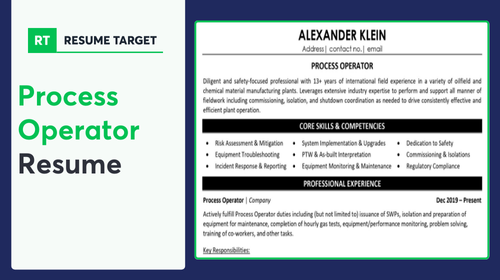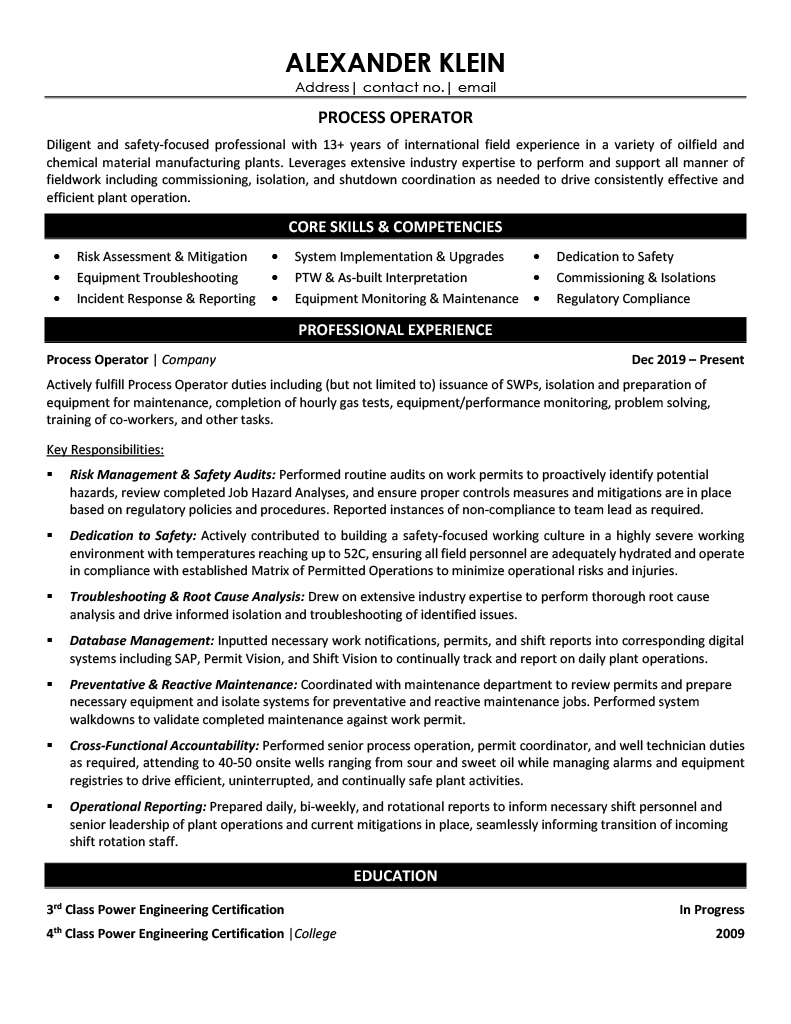

Standing out in a competitive industrial environment is tough when every process operator claims the same basic skills. Your years of hands-on experience deserve more than a basic list of duties and responsibilities.
Are you struggling to showcase your real value to employers? A well-crafted resume can transform your technical expertise and operational achievements into compelling proof that you're the best candidate for the job.
Resume Target specializes in helping process operators translate complex technical work into clear, achievement-focused stories. We'll show you how to build a resume that captures attention and proves your worth as a skilled industrial professional.

At the heart of modern manufacturing facilities, process operators serve as the vital link between raw materials and finished products, monitoring and controlling complex production systems that transform basic ingredients into everyday essentials we all depend on.
Your role as a process operator involves masterfully orchestrating industrial equipment, maintaining precise control over variables like temperature, pressure, and flow rates, while constantly analyzing data to ensure production meets strict quality and safety standards.
Whether you're just starting out or looking to advance your career, the process operations field offers numerous opportunities for growth, from specialized technical roles to supervisory positions where you can lead teams and optimize entire production systems.
Let's talk about what's exciting in the process operator field! Your career path as a process operator opens doors to impressive earning potential, with top professionals in places like Sacramento and Boston commanding substantial compensation packages. And guess what? The industry continues to reward specialists in chemical, gas, and petroleum operations with competitive salaries, especially if you're willing to work in high-paying regions like the Pacific Northwest or California.
Figures from: U.S. Bureau of Labor Statistics
Start your journey as a Process Operator and climb the ladder to leadership roles through experience and certifications. Your path can lead from equipment operation to plant management with the right skills and dedication.
Beyond basic operational knowledge, advancing in this field requires mastering specialized technical skills and developing strong leadership capabilities.
- Manufacturing Process Control Systems - Chemical Safety and Handling Protocols - Equipment Maintenance and Troubleshooting - Team Leadership and CommunicationLaunch your Process Operator career by earning an Associate's degree in Process Technology, which combines hands-on training with essential technical knowledge to prepare you for this in-demand industrial role.
To advance in this field, you'll need to develop key technical abilities, including knowledge of manufacturing production and processes, which will form the foundation of your career growth.
Requirements from Zippia
From Gulf Coast chemical plants to Midwest manufacturing, process operator roles are thriving in industrial hubs nationwide.
Figures from U.S. Bureau of Labor Statistics
Struggling to showcase your hands-on experience with process control, equipment monitoring, and safety protocols in a way that catches a hiring manager's eye? This comprehensive, section-by-section guide will walk you through creating a professional process operator resume that highlights your technical expertise and operational achievements.
As a process operator, you know how to monitor complex systems and maintain precise control, but condensing your valuable skills into a few powerful sentences can feel more challenging than troubleshooting a production line issue.
While you excel at maintaining safety protocols and optimizing manufacturing processes, translating these technical abilities into compelling resume language that catches a hiring manager's attention requires a different kind of precision - one that showcases both your operational expertise and attention to detail.
How would you characterize your overall approach to maintaining process efficiency and safety standards across the different industrial processes you've managed?
Reason: This helps frame your professional identity and core philosophy as a Process operator, showing potential employers your fundamental understanding of the role's key responsibilities and priorities.
What types of processing systems and industrial equipment have shaped your expertise, and how has this combination of experience influenced your operational style?
Reason: This question helps you articulate your technical foundation while demonstrating the breadth of your experience, giving employers a clear picture of your operational capabilities.
How do you balance your technical process control skills with your ability to collaborate across maintenance, quality control, and management teams?
Reason: This helps you highlight your dual role as both a technical expert and team player, emphasizing the soft skills that are increasingly valuable in modern manufacturing environments.
As a process operator, you need to demonstrate both technical expertise in operating complex industrial equipment and maintaining safety protocols, while also showing your ability to handle day-to-day monitoring and troubleshooting tasks.
Your resume should highlight your proficiency with specific control systems and equipment, along with essential skills like safety compliance, quality control monitoring, and your ability to respond to emergency situations.
Showcase your process control expertise by organizing your experience into three powerful sections: a concise role overview that sets the stage, measurable achievements that highlight your operational improvements, and core responsibilities that demonstrate your hands-on technical capabilities.
Process Operators often struggle to translate their daily operational responsibilities into compelling achievements that catch a hiring manager's attention. Transform your routine monitoring and control activities into powerful metrics by highlighting cost reductions, efficiency improvements, and safety records that directly impact the bottom line.
The responsibilities section demonstrates how Process Operators maintain complex industrial systems and ensure safe, efficient operations. Your role description should help hiring managers understand how you contribute to production goals while maintaining safety and quality standards.
Your education and certifications demonstrate your technical expertise in process operations and safety protocols. List your most relevant qualifications first, focusing on industry-recognized certifications like HAZWOPER or Process Technology degrees that directly relate to plant operations and chemical handling.
Now that you've built a strong foundation using Resume Target's proven resume writing guidelines, you're ready to transform your resume into a powerful tool for landing process operator positions.
While many candidates make the mistake of using the same resume for every application, successful process operator job seekers know that customization extends far beyond just tweaking their cover letter.
By carefully aligning your resume's keywords and achievements with each specific job posting, you'll not only sail through ATS screening systems but also immediately show hiring managers that you understand their exact operational needs and requirements.
Ready to stand out from other applicants? Let's turn your solid resume into a laser-focused document that speaks directly to employers and proves you're the process operator they've been searching for!
Don't let a lack of experience hold you back from launching your career as a Process Operator! Your journey into industrial operations can start strong by showcasing your technical education, relevant training certifications, and hands-on lab or simulation experience.
Focus on highlighting your safety awareness, technical aptitude, and ability to follow detailed procedures in your resume. For more guidance on crafting the perfect entry-level resume, check out our Student Resume Writing Guide to help you stand out to employers.
Your summary section is your chance to showcase your technical training, safety certifications, and hands-on laboratory experience from your education and internships.
Focus on highlighting your understanding of manufacturing processes, safety protocols, and quality control procedures to demonstrate your readiness for this operational role.
"Detail-oriented and safety-conscious Process Operator with foundational training in manufacturing operations and quality control procedures. Completed comprehensive technical certification program with hands-on experience in equipment monitoring, process control systems, and safety protocols. Demonstrated strong mechanical aptitude through laboratory work and simulation training. Seeking to leverage technical knowledge and problem-solving abilities to contribute to operational excellence in a manufacturing environment."
Now's your chance to showcase the technical training and hands-on education that makes you a qualified process operator - make every certification and course count!
Transform your educational background into compelling content by highlighting specialized coursework like "Industrial Process Control"or "Safety Management Systems,"plus any hands-on training projects that demonstrate your practical operating skills.
unavailableRelevant Coursework: Process Safety Management | Industrial Operations | Chemical Processing Fundamentals | Equipment Troubleshooting | Quality Control Systems | Process Control & Instrumentation
Key Projects:
Process Control Simulation Project: Developed comprehensive understanding of industrial process control systems through hands-on simulation training, resulting in mastery of standard operating procedures and emergency response protocols.
Plant Operations Team Project: Collaborated with four-person team to optimize a simulated chemical processing unit, achieving 15% improvement in operational efficiency.
Leverage your technical training, hands-on experience from vocational programs, and any relevant certifications to create a compelling skills section that showcases your readiness to excel in process operations.
As an entry-level Process Operator, your foundation in these core skills positions you well for a career path that offers steady growth opportunities and increasing responsibility in manufacturing and production environments.
Let's face it - translating your hands-on plant experience and complex operational knowledge into a clear, powerful resume can feel like trying to explain a DCS system to someone who's never seen a control room.
At Resume Target, we specialize in crafting resumes for Oil and Gas professionals just like you, having helped countless process operators showcase their technical expertise, safety records, and operational achievements.
Our deep understanding of control room operations, field work, and plant processes means we know exactly how to position your skills to catch a hiring manager's attention.
With major industry expansions happening and facilities actively seeking experienced operators, now is the perfect time to upgrade your resume - connect with us today for a free consultation to discuss your career goals.
Impress any hiring manager with our Oil & gas resume writing service. We work with all career levels and types of Oil & gas professionals.
Learn More → Oil & gas Resume Writing Services